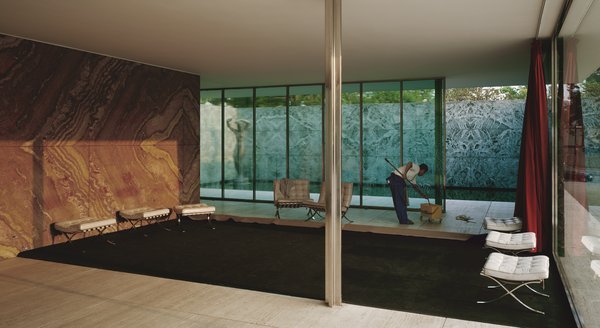
Artist:
Jeff Wall (born 1947 in Vancouver, Canada; lives and works in Vancouver).
Materials:
Transparency on lightbox; 1870 x 3510 x 260 mm.
Description:
A picture of a window cleaner attending to Mies’s Barcelona Pavilion (1929).
“Morning Cleaning, Mies van der Rohe Foundation, Barcelona is a color photograph displayed as a transparency in a lightbox that measures over three and a half meters in length and almost two meters in height. It shows the interior of the German Pavilion in Barcelona, an iconic glass-walled building designed by the German architect Ludwig Mies van der Rohe (1886–1969). The minimally furnished space is seen in the bright light of early morning. In the foreground, a gleaming steel pillar divides the composition vertically almost in half. Beyond the pillar, across an expanse of dark carpet, an attendant is in the process of cleaning a glass-panelled wall. The morning sun illuminates the clear and crisp lines of the building’s architecture, while producing pronounced shadows on a deeply veined onyx wall to the left. On the panels the custodian has prepared for cleaning, streaming water adds a random design onto the surface of the symmetrically-patterned glass, which partially obscures a courtyard where a sculpture of a female nude by Georg Kolbe (1877–1947) stands by a pond.
“Mies’s pavilion was first constructed in 1928–9 for the 1929 International Exposition held in Barcelona. An important example of high modernist architecture, it was disassembled in 1930 at the conclusion of the exhibition, but reconstructed by Barcelona City Council in the 1980s because of its cultural significance. The Pavilion is now open to the public. Mies designed every detail of the Pavilion and its interior, including the steel Barcelona chairs and stools upholstered in white leather that are visible in Wall’s image. Whilst the building’s formal rigor and its opulent materials convey a sense of luxury, the appearance of a cleaner calls attention to the support systems necessary to maintain Mies’s artistic vision, which he characterised with the famous principle ‘less is more.’ Wall has said: ‘[These] buildings require an especially scrupulous level of maintenance. In more traditional spaces a little dirt and grime is not such a shocking contrast to the whole concept. It can even become patina, but these Miesian buildings resist patina as much as they can.’ [Quoted in Craig Burnett, Jeff Wall (London: Tate, 2006, 90-1.]
“Wall has pictured cleaners in other works that, as this one, make visible activities which are normally unseen or overlooked. In Volunteer and Housekeeping, both 1996, a man mops the floor of a shabby drop-in center kitchen and a chambermaid exits a pristine but nondescript hotel room. ‘Cleaning is mysterious,’ the artist has commented, ‘since it is the labour that erases itself if it is successful.’ According to Wall, the idea of maintenance is ‘to do with virtue. It’s about what we have to do to be virtuous.’ (Quoted in Burnett, 90.) His concept for Morning Cleaning, Mies van der Rohe Foundation, Barcelona has its origins in an idea to depict a cleaner working in a private house and developed into this image after he staged an exhibition, entitled Odradek, at the Pavilion in 1999.
“The artist has explained of this work: ‘The man in the picture is the real cleaner. The picture is documentary in the sense that that’s exactly what he would be doing at that moment of the day. It’s what I call ‘near documentary.’ Although I arranged the picture and worked in collaboration with the cleaner, the picture resembles very closely what a snapshot made at that moment would show.”
—Alice Sanger, “Jeff Wall: Morning Cleaning, Mies van der Rose Foundation, Barcelona 1999,” Tate, last modified December 2010.

